
One way for a country to accelerate the pace toward ending hunger and undernutrition is to learn from the successes of other countries. Officially launched on June 29, 2016, Nourishing Millions: Stories of Change in Nutrition helps fill this need. The book offers case studies of particular successes in nutrition security involving a wide range of actors and approaches, and the lessons that their stories offer. “Nourishing Millions” is a key output of Compact2025’s global Knowledge and Innovation Hub, which among other activities provides synthesized lessons for accelerating progress toward ending hunger and undernutrition.
“We need to accelerate progress to achieve a nutrition-driven global food system,” said IFPRI Director General and Compact2025 Leadership Council member Shenggen Fan. “Fortunately, the tools to do that are within our grasp and this book is such an example.”
As identified in recent roundtable discussions in Compact2025 focal countries, there is a need for more evidence on what works in combatting undernutrition—and what doesn’t—to help accelerate progress. The book focuses on programs, policies, investments, and individuals from national to community levels that have made big impacts on nutrition, and these lessons can help shorten the learning curve for Compact2025 focal countries and beyond. For example, through an approach that included maternal education, increased sanitation services, and a tighter focus on maternal and child healthcare, coupled with rapid economic growth, Brazil reduced by more than two-thirds the under-five mortality rate and reduced socioeconomic inequality in undernutrition.
Further, the lessons provided in Nourishing Millions can help Compact2025 focal countries learn from each other. Bangladesh used nutrition-sensitive drivers in an environment of pro-poor economic growth to reduce poverty and the number of children who were underweight or stunted. In Ethiopia, the Productive Safety Net Program reduced food insecurity from an average of 3.6 months to 2.2 months in just two years, among other improvements. Malawi championed the use of community-based management of acute malnutrition (CMAM) after the 2001/02 food emergency, and expanded its coverage leading to the highest level of CMAM scale-up of any country. Small farmers in Rwanda and other countries now grow beans bred with high iron content which can then improve body iron.
Beyond providing data, the book reveals successes that have taken place in real-world contexts for a more complete picture of what works in nutrition.
“Statistics are important in fighting global hunger and malnutrition, but it’s critical that we don’t forget the names, faces, and stories of those who feel it firsthand,” said Stuart Gillespie, IFPRI senior research fellow, co-editor of Nourishing Millions and co-chair of the Compact2025 Technical Advisory Committee. “This book brings together the most intriguing stories about change in nutrition from the past five decades to alter perceptions and inspire action."


